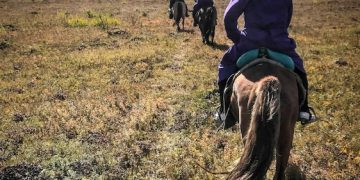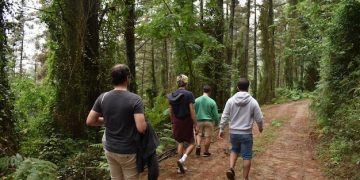Responsible wildlife tourism practices for sustainable adventures

Responsible wildlife tourism practices focus on ethical interactions, conservation support, and environmental preservation, ensuring wildlife well-being while providing sustainable economic benefits to local communities.
Responsible wildlife tourism practices are essential for ensuring that our interactions with nature are beneficial, not harmful. Have you ever wondered how your travel choices impact wildlife and ecosystems? In this article, we’ll delve into the importance of making informed decisions that respect animal welfare and conservation.
Understanding responsible wildlife tourism
Understanding responsible wildlife tourism is crucial for ensuring that our interactions with nature do not harm ecosystems. By being mindful of our choices, we can enjoy wildlife encounters without negatively impacting animals and their habitats.
What is Responsible Wildlife Tourism?
Responsible wildlife tourism involves traveling in ways that consider the well-being of wildlife and the environment. This form of tourism promotes conservation and ethical encounters. When we choose to engage in responsible practices, we help preserve natural areas and protect animal species.
Benefits of Responsible Wildlife Tourism
There are several key benefits to participating in responsible wildlife tourism:
- Promotes conservation of natural habitats.
- Enhances local economies through sustainable practices.
- Encourages education and awareness about wildlife.
- Supports the well-being of animal populations.
By recognizing these benefits, travelers can appreciate how their choices contribute to the greater good. For instance, observing animals from a distance can minimize stress for wildlife.
Moreover, forming partnerships with local communities allows tourists to experience authentic interactions while supporting conservation efforts. Many areas depend on wildlife tourism for their economic sustainability, making responsible practices even more vital.
How to Practice Responsible Wildlife Tourism
Certain actions can guide your experiences:
- Always choose ethical tour operators.
- Follow guidelines for wildlife viewing (keeping a safe distance).
- Avoid purchasing products made from endangered species.
- Respect local cultures and wildlife protection laws.
When individuals make these choices, they ensure that tourism does not come at the expense of wildlife. This conscious approach nurtures a deeper connection with the environment and encourages more sustainable travel habits.
By understanding the principles of responsible wildlife tourism, we can enhance our adventures while also safeguarding the world we cherish. Every small act contributes to protecting our planet for future generations.
Benefits of sustainable wildlife tourism

The benefits of sustainable wildlife tourism are profound, impacting both local communities and the environment positively. This approach to tourism can lead to long-lasting advantages that support biodiversity and foster a commitment to conservation.
Economic Contributions
Sustainable wildlife tourism can significantly contribute to local economies. When done responsibly, it creates jobs and supports local businesses. Tourists often spend money on accommodations, tours, and local crafts, which helps communities thrive.
Conservation Efforts
Engaging in sustainable practices plays a vital role in conservation. Tourism can provide the funding necessary to protect natural habitats and endangered species. By generating revenue through wildlife tourism, areas can enhance efforts to preserve ecosystems and biodiversity.
- Sustainable programs help fund wildlife reserves.
- Tourism income can be reinvested into conservation projects.
- Ethical tour operators prioritize wildlife protection.
- Education about local ecosystems is improved through tourism.
Furthermore, when tourists participate in these experiences, they often develop a deeper understanding and appreciation for wildlife. This awareness can translate into advocacy for environmental causes, creating a ripple effect in conservation efforts.
Another significant benefit is the promotion of cultural exchange. Tourists have the opportunity to engage with local communities, learning about their traditions and knowledge related to wildlife conservation. This interaction fosters respect and allows for the sharing of essential conservation practices.
Community Involvement
When local people are involved in wildlife tourism, they take pride in preserving their environment. Communities become active participants rather than passive observers of tourism. This engagement ensures that they benefit directly from protecting their natural resources, which enhances sustainable development.
- Empowering locals leads to more effective conservation.
- Communities can showcase their unique biodiversity.
- Local traditions can be shared with tourists, enriching experiences.
- Greater economic resilience is built through diverse tourism options.
Ultimately, the benefits of sustainable wildlife tourism extend beyond financial gain. They inspire a collective responsibility towards protecting our planet. Each interaction with wildlife is an opportunity to advocate for nature and ensure its preservation for future generations.
Key practices for responsible wildlife encounters
Key practices for responsible wildlife encounters are essential to preserving both animals and their habitats. By following these guidelines, we can enjoy nature while ensuring its protection.
Maintain a Safe Distance
One of the most crucial practices is to keep a safe distance from wildlife. Approaching too closely can stress animals, alter their behavior, and even put both you and the wildlife at risk. Always observe from a respectful distance to allow animals to act naturally.
Choose Ethical Tour Operators
When engaging with wildlife, it is vital to select tour operators that prioritize conservation and animal welfare. Ethical operators provide education on wildlife and are committed to preserving their habitats. Look for certifications or reviews that confirm their practices before booking a tour.
- Research the company’s conservation efforts.
- Check for responsible wildlife viewing guidelines.
- Support businesses that benefit local communities.
- Ask questions about their animal welfare policies.
By making informed choices, you contribute to the well-being of the environment and enhance your experience.
Another practice focuses on respecting local regulations and guidelines. National parks and wildlife reserves often have specific rules in place to protect both wildlife and visitors. Understanding and following these regulations is crucial for nurturing a healthy ecosystem.
Limit Noise and Disruption
Wildlife is sensitive to noise and disturbances. Keeping voices low and minimizing sudden movements can prevent startling animals. Being quiet allows for more meaningful interactions and respects the animal’s habitat.
- Observe animals silently for a better experience.
- Avoid using flash photography, which can harm wildlife.
- Do not feed animals, as it alters their natural behaviors.
- Stay on designated paths to protect vegetation.
These simple actions contribute to a more respectful and enjoyable wildlife experience. Furthermore, understanding animal behavior enhances your appreciation of nature and can lead to more enriching moments.
When everyone participates in responsible wildlife encounters, we create a culture of conservation and respect for nature. Each positive interaction fosters a deeper connection and encourages others to follow.
How to choose ethical wildlife tours

Choosing ethical wildlife tours is essential for ensuring that your travel experience benefits both animals and local communities. By considering a few key factors, you can make informed decisions that support conservation efforts.
Research Tour Operators
Start by researching different tour operators and their practices. Look for companies that prioritize wildlife safety and habitat preservation. Websites and reviews can help you gauge their reputation.
Ask About Conservation Efforts
It’s important to inquire about the company’s conservation efforts. Ethical operators not only provide tours but also contribute to wildlife protection and habitat restoration. Here are some questions you can ask:
- What initiatives does the company support?
- How is a portion of the tour cost used for conservation?
- Do they engage with local communities in their efforts?
- What measures do they take to ensure animal welfare?
Answers to these questions will help you assess their commitment to protecting wildlife.
Another aspect is to look for eco-certifications. Many organizations provide certifications for responsible and sustainable tourism practices. These certifications often require companies to meet specific standards in terms of environmental impact and ethical treatment of wildlife.
Be Aware of Wildlife Interactions
When you’re considering a tour, observe how the company conducts wildlife interactions. Ethical tours should promote observing animals in their natural habitats without trying to touch or feed them. It’s essential to prioritize the animals’ comfort and safety above your experience.
- Ensure interactions are non-intrusive.
- Look for tours that educate rather than exploit.
- Avoid companies that promote direct contact with wild animals.
- Understand their policies on approaching wildlife.
By following these guidelines, you ensure a positive impact on wildlife and the environment. Making thoughtful choices about tours contributes to a more sustainable tourism industry.
Always trust your instincts; if a tour seems exploitative or disrespectful, it’s best to look for another option. Your travel choices hold the power to influence conservation efforts and promote a more responsible tourism culture.
FAQ – Frequently Asked Questions about Responsible Wildlife Tourism
What is responsible wildlife tourism?
Responsible wildlife tourism focuses on ethical interactions with wildlife, ensuring their well-being while promoting conservation efforts.
How can I choose an ethical wildlife tour?
Look for tour operators that prioritize animal welfare, support conservation initiatives, and provide education about local ecosystems.
Why is it important to maintain a distance from wildlife?
Keeping a safe distance helps reduce stress on animals and allows them to behave naturally, promoting a healthier environment.
What are the benefits of sustainable wildlife tourism?
Sustainable wildlife tourism supports local economies, funds conservation efforts, and fosters a deeper connection between tourists and nature.





